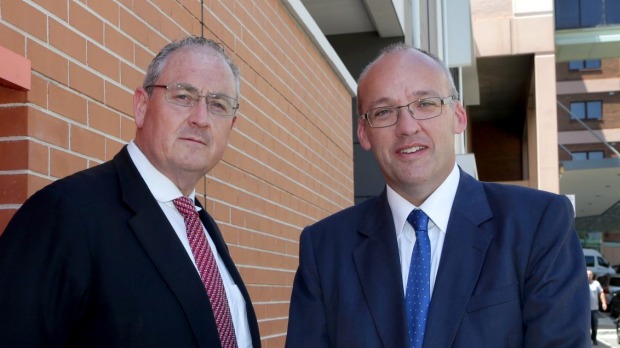
Opposition health spokesman Walt Secord, left, with NSW Labor leader Luke Foley. Photo: Jane Dyson
NSW opposition health spokesman Walt Secord is calling for a doubling of the Medicare levy to help cover the multibillion dollar shortfall in health funding faced by NSW under cuts to Commonwealth payments in the federal government’s 2014 budget.
Mr Secord said a doubling of the Medicare levy to 4 per cent was a fairer solution than Premier Mike Baird’s proposal for an increase in the GST to 15 per cent.
“Furthermore, it would raise more funds and would mean that those with the highest means would make the highest contribution,” he said.
Mr Baird and NSW Treasurer Gladys Berejiklian have said they favour the GST increase to cover an estimated $35 billion national health funding shortfall by 2030.
There would be no broadening of the GST base to include fresh food or education. Those earning below $100,000 would be compensated through income tax cuts and other payments.
Opposition Leader Luke Foley has previously rejected the proposal as “lazy” and said state governments should raise extra money by agreeing to set taxes at the same rate to eliminate the competition between them that erodes all their revenue bases.
The doubling of the Medicare rebate has been proposed by Victorian Premier Daniel Andrews. But NSW has rejected the option as it is an increase to income tax.
However, Mr Secord said doubling the Medicare levy to 4 per cent “would raise $29 billion of which more than $21 billion would remain after protections to lower incomes”.
In a speech to the NSW Parliament last week he noted that the surcharge is not paid on a taxable income equal to or less than $20,896 or $33,044 for pensioners and it is only partly paid by those with a taxable income between $20,896 and $26,121 or $33,044 and $41,306, for pensioners.
“With our ageing population and the rising costs of health and hospitals, we need a funding model that responds to the real costs of healthcare in Australia,” he said on Sunday.
“Increasing the GST is a very unfair model and it is a more regressive form of taxation as it has a higher marginal effect on lower income earners than it does on higher income earners.
“Unfortunately, the increase of the GST would hit Australian families the hardest. The fairest approach is to increase the Medicare levy.”
